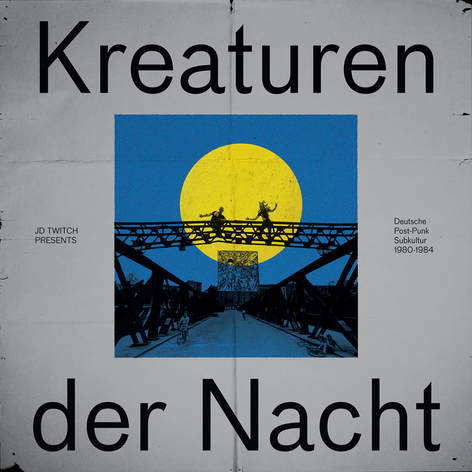|
Interview by Kurt B. Reighley In his latest compilation collection, Kreaturen Der Nacht, Scottish DJ and musician JD Twitch showcases a comprehensive collection of German underground sounds from the early 1980s. The release rediscovers the overlooked and underappreciated post-punk artists with an emphasis on the women artists and the Deutsche dub scene. We spoke with Twitch to further contextualize his discoveries and gain insight on his impressions from the era. Scottish musician Keith McIvor – better known as JD Twitch – first attracted international acclaim at the turn of the century with Mount Florida; the short-lived experimental dance duo released one album, Arrived Phoenix (2001) and three stellar EPs including 2000's Storm, which featured a radical reinvention of "Another Thought" that predated the Arthur Russell revival by several years. Along with JG Wilkes, Twitch co-hosted the legendary party Optimo Espacio, which ran Sunday nights at Glasgow's Sub Club from 1997 to 2010, lauded by club-goers and music lovers for its eclectic, innovative programming. In addition to making original music, running the Optimo Music imprint, and delivering mind-bending remixes for artists ranging from Django Django to Nigerian funk legend William Onyeabor, Twitch has sealed has reputation as a trusted tastemaker via myriad compilations, including two cassette-only deep dives into the On-U Sound catalog (Are People People?, 2015 and Far Away Chants, 2016), and So Low, his 2016 survey of cold wave deep cuts. His latest collection, Kreaturen Der Nacht, explores his interest in German underground sounds from the early 1980s, informed by a youthful fascination with bands like Einstürzende Neubauten and cinematic fare including the notorious Christiane F: Wir Kinder vom Bahnhof Zoo and the films of Wim Wenders. While only a few of the artists will be familiar to discerning listeners (Malaria, Die Haut), all this material is ripe for rediscovery. Seriously, try sitting still to opening cut "Amanita" by Leben and Arbeiten, which weds a bass riff reminiscent of "Bela Legosi's Dead" to the propulsive punk-funk of Delta 5 and Gang of Four. Other cuts showcase surprising fixations with cut-and-paste techniques and dub reggae, plus a strong feminist viewpoint. The 16-track collection comes packaged with top-notch liner notes, including observations from many of the scene's key players, period photography, and an opening essay from Twitch that contextualizes the whole aural odyssey. Regardless, to help fill in some gaps and illuminate the lesser-known selections, Twitch kindly answered ten questions exclusively for Trial And Error Collective. T&E: In your liner notes you write "Perhaps because I don't typically pay that much attention to lyrics I've always been drawn to music sung in different languages …" What particular qualities of the German language, as spoken or sung, resonate with you as a musician and a listener? DJ Twitch: I sometimes think Brazilian Portuguese is the most beautiful sung language. Or perhaps it is one of the South East Asian languages, one of the thousands of Nigerian languages, Bulgarian or even Gaelic, the language of the native Gaels of my own country, Scotland, of which I know barley a word. I don’t think many people would add German to that list but I might. Almost all the German I know is a result of listening to German-language sung music. I could probably have a conversation based entirely around Einstürzende Neubauten lyrics though I might not be entirely au fait with their meaning. I think I'm drawn to the strength, the expressiveness, the forcefulness, the perceived seriousness. It seems particularly well suited to the type of music we are discussing here. It's hard to believe the world slept on "Amanita" by Leben Und Arbeiten for so many years. How did you discover this particular record? What was your initial reaction upon hearing it? I was playing in Cologne a few years back and had some time to go record shopping and came across this 12" there. It was quite cheap, was on über-good label ZickZack and looked intriguing, so it seemed a no-0brainer to pick it up. When I got home and played it I thought it was pretty cool but then I got to “Amanita" which just blew my mind. It’s the A3 track which seems super strange as it really is the stand-out track, by some margin in my opinion. I must have played its about 20 times in a row and then immediately ripped it and let a few friends hear it, all of whom became equally smitten. It really is a mystery how this one stayed under the radar for so long. I’d love to find out that it was actually a massive club hit in Germany in 1982 but nobody I know there seems to know of it either. It appears to be a bona fide lost classic. This album teems with great selections by powerful female artists: Malaria!, Ausserhalb, Mania D. Is that more a your personal listening biases, or the musical landscape of the time and place, or some of both? Both. My taste has always skewed towards music made by women and right from a very early age I was drawn to powerful female artists. This era was a time where women artists particularly came to the fore and it was totally normal for women be as active in the scene as men. It is one of the many things I love about music from the post-punk era, across the world; for once it wasn’t all male voices dominating the conversation. The tracks by Sprung Aus Den Wolken, P1/E, and Franz Erlmeier & Fritz Köstler incorporate elements of dub/reggae. Grace Jones' could've sung "Öffnen Sie Mal Ihre Tasche," and "Up And Above" sounds like a lost On-U Sound gem. The cultural intersection of punk and reggae in the UK during this period is well-documented, but how did this musical sensibility arise in Germany? Yes, Grace Jones would have fitted very well on that. I think in the mid-to-late 1970s, anyone interested in music with open ears was probably checking out, or at least being exposed to, the dub sounds coming out of Jamaica. I can only guess what its impact was in Germany but there was patently a trend, at least in Berlin, to experiment with dub techniques. Often they got it really wrong (in a great way) and initially one of my original ideas for this compilation was for it to focus on this “Deutsche dub" side. Of course, Berlin then went on to have a fascination with Jamaican music and all things dub-wise a decade later with Basic Channel, the Hard Wax record shop, Dubplates & Mastering mastering and cutting house, and the legions of dub techno copyists that followed. Interestingly, Moritz Van Oswald – who was half of Basic Channel and co-owner of Hard Wax and Dubplates & Mastering – was very active during this earlier era where he had been a member of Palais Schaumburg. Despite this Berlin dub fascination, I remember the second or third time I ever played in Berlin playing a reggae track and the (very pompous) English promoter running over and screaming at me “This is Berlin!! YOU CAN’T PLAY REGGAE”. Meanwhile the full dancefloor was patently completely unaware that playing such music was verboten and appeared to me to be lapping it up. A number of selections, particularly "Pingelig" by Aus Lauter Liebe and "Scharfer Scnhitt (No.1)" by Populäre Mechankik, seem to emphasize art and ideas over execution; concepts and creativity take precedence before performance and production values. Again, is this a reflection of your personal biases or cultural trends? I’d say it is more a reflection of my personal preferences. When I first heard “Pingelig” I was floored, partly in amusement, partly in awe. Initially it appears no musical skills whatsoever are present, but in a similar way to New York’s DNA it soon becomes apparent that something magical is being created; something akin to an accidental funk, particularly in the last few bars. It is one of the purest expressions of the DIY spirit I have ever encountered. I like a lot of music with advanced or high-tech production values but there is something refreshing, particularly in our current era where so much music is all production and perhaps not so much about the creativity or spirit, to hear music that is pure expression, where the idea and the doing is the most important part. As soon as one hears "Wunderbar" by Christiane F., there's no denying its rubbery charm. Nobody would've batted an eye if it'd be released on ZE. But because it came out on a punk label, and Christiane F. had been the subject of a controversial book and movie, did the single strike you as opportunistic or cynical before you'd spent time with the music? When I was a teenager, Christiane F was a really, really big film here, at least in the circles I mixed in. I would have seen it at least three years after it had come out in Germany; media could move quite slowly across borders in this era. She was an über cult hero here in the UK and the music press of the time couldn’t get enough of her and portrayed her as a renaissance woman, so it didn’t seem that strange that she was also making music. I actually didn’t hear this version, which indeed could easily have been on ZE, until way, way later, but rather knew the “Final Church / Health dub” version that came out as Christiana. It’s a lot more intense and dubbed out and was apparently a reaction to the “smoothness” of the US version which she supposedly hated. The Christiana version was done in collaboration with various Neubauten members (Alexander Hacke of Neubauten was her boyfriend at that time). I adored that version but actually, I like this version on the compilation even more. Those claps are just to die for. There are some delightful contributions from U.S. and U.K. artists on this very German album, including Lydia Lunch and David Javelosa from Los Microwaves; even David Cunningham from Flying Lizards pops up in the narrative. Any other points of intersection between these worlds that you find particularly amusing, entertaining, or inspiring? I sometimes wonder whether there was something more than serendipity going on around the musical world at this time. Was it morphic resonance? Perhaps it is in reality much more simple and people in different places were listening to similar things and coming to similar conclusions combined with there being more dialogue between them than we might imagine. Early Neubauten definitely shares characteristics with New York’s No Wave and I know Blixa Bargeld was hugely infatuated with DNA and in particular that one-off (astounding) Arto/Neto 12” on ZE. Early Neubauten ticks all the right boxes for being a definition of No Wave. Aus Auter Liebe are 100% Neu Wave. I think one of the most influential intersections was The Birthday Party moving to Berlin in the early '80s. They fell in love with Berlin and it seems Berlin fell in love with them and somehow the overall aesthetic and dynamic shifted as a result. A hint of this and a taste of how “cool” they were perceived to be can be seen in Wim Wender’s Wings Of Desire, made a little later than the era of this compilation, but still before the wall came down. "Fred Vom Jupiter" by Andreas Dorua & Die Marinas is such a powerful earworm. It also represents a kind of tipping point in German music where underground sounds move into the mainstream, and commercial interests become involved. What inspired you to include such a canonical classic among the other, less-familiar selections? I knew right from the start that I didn’t want this compilation to cover all the better-known, iconic tracks of that era. Much as I love DAF or whoever, those acts are now so canonical that it felt right to go a little deeper. At the same time, it’s also a very personal collection of favorite records of mine that continue to thrill me. "Fred Vom Jupiter" feels like it has been with me most of my life. I met one of my oldest friends through discovering we both loved this song as teenagers. It has criss-crossed my life at various key points and was a big hit at the early Optimo nights. I’ve also had the very good fortune to meet Andreas Dorau, who is a wonderful human being, on a couple of occasions when visiting the esteemed Golden Pudel club in Hamburg. It would simply not have felt right to have not included "Fred Vom Jupiter," and I love that it is almost an anomaly on the comp being that to many people it is such a classic. Maybe there is still someone out there yet to hear it who will come across it as a result of it being here? That would make me very happy. You've remarked that the "Wunderbar (Optimo Edit)" on here is really just an abbreviation, not a true Twitch edit. Is there a particular song on this record, or from this scene, that you would like to rework more thoroughly, a la your versions of James White and the Blacks' "Contort Yourself" and Allez Allez's "She's Stirring Up?” There is. "Amanita" would be the one to tick that box and indeed I tried, and failed, to do a version of it. I just couldn’t get the feel I was looking for or come up with anything that did justice to the original. Maybe I’ll go back to it one day but it does have a slight after-life in that some of the elements made it into this track I did that features Chloe Sevigny. I’m not sure how discernible the “Amanita” bits are now but you can judge for yourself. In your opening essay, you mention Einstürztende Neubauten, Holger Hiller, and a few other artists that didn't make the track list, for one reason or another. If you could add one more song to Kreaturen Der Nacht, regardless of licensing issues, what would it be? There is one version of the compilation that comes with a limited-edition bonus fanzine where I write about several tracks that would have been great other choices to include. One that I really wanted to include but was impossible was an absolutely sensational cover version of "Satisfaction" by The Rolling Stones by Sentimentale Jugend (Neubauten’s Alexander Hacke and Christiane F). I would be very happy if I never heard the original ever again but this cover version rules and completely tears the song apart, getting increasingly messed up as it progresses. I’ve played this in my DJ sets a few times and it will make some people completely freak out while many others will probably decide that it's a good time to head to the cloakroom.
0 Comments
Leave a Reply. |
Categories
All
Interview Archives
July 2024
|




 RSS Feed
RSS Feed